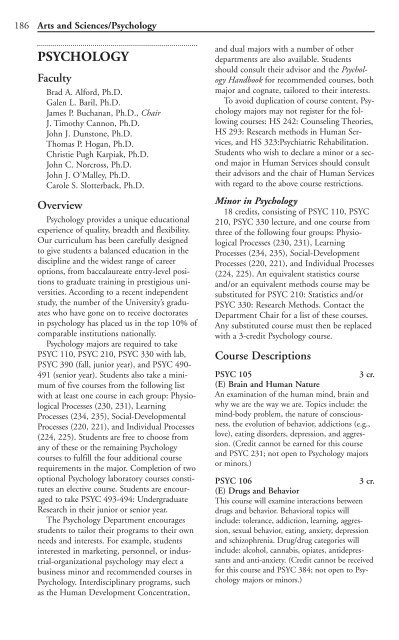2003-2004 - The University of Scranton
2003-2004 - The University of Scranton
2003-2004 - The University of Scranton
You also want an ePaper? Increase the reach of your titles
YUMPU automatically turns print PDFs into web optimized ePapers that Google loves.
186 Arts and Sciences/Psychology<br />
PSYCHOLOGY<br />
Faculty<br />
Brad A. Alford, Ph.D.<br />
Galen L. Baril, Ph.D.<br />
James P. Buchanan, Ph.D., Chair<br />
J. Timothy Cannon, Ph.D.<br />
John J. Dunstone, Ph.D.<br />
Thomas P. Hogan, Ph.D.<br />
Christie Pugh Karpiak, Ph.D.<br />
John C. Norcross, Ph.D.<br />
John J. O’Malley, Ph.D.<br />
Carole S. Slotterback, Ph.D.<br />
Overview<br />
Psychology provides a unique educational<br />
experience <strong>of</strong> quality, breadth and flexibility.<br />
Our curriculum has been carefully designed<br />
to give students a balanced education in the<br />
discipline and the widest range <strong>of</strong> career<br />
options, from baccalaureate entry-level positions<br />
to graduate training in prestigious universities.<br />
According to a recent independent<br />
study, the number <strong>of</strong> the <strong>University</strong>’s graduates<br />
who have gone on to receive doctorates<br />
in psychology has placed us in the top 10% <strong>of</strong><br />
comparable institutions nationally.<br />
Psychology majors are required to take<br />
PSYC 110, PSYC 210, PSYC 330 with lab,<br />
PSYC 390 (fall, junior year), and PSYC 490-<br />
491 (senior year). Students also take a minimum<br />
<strong>of</strong> five courses from the following list<br />
with at least one course in each group: Physiological<br />
Processes (230, 231), Learning<br />
Processes (234, 235), Social-Developmental<br />
Processes (220, 221), and Individual Processes<br />
(224, 225). Students are free to choose from<br />
any <strong>of</strong> these or the remaining Psychology<br />
courses to fulfill the four additional course<br />
requirements in the major. Completion <strong>of</strong> two<br />
optional Psychology laboratory courses constitutes<br />
an elective course. Students are encouraged<br />
to take PSYC 493-494: Undergraduate<br />
Research in their junior or senior year.<br />
<strong>The</strong> Psychology Department encourages<br />
students to tailor their programs to their own<br />
needs and interests. For example, students<br />
interested in marketing, personnel, or industrial-organizational<br />
psychology may elect a<br />
business minor and recommended courses in<br />
Psychology. Interdisciplinary programs, such<br />
as the Human Development Concentration,<br />
and dual majors with a number <strong>of</strong> other<br />
departments are also available. Students<br />
should consult their advisor and the Psychology<br />
Handbook for recommended courses, both<br />
major and cognate, tailored to their interests.<br />
To avoid duplication <strong>of</strong> course content, Psychology<br />
majors may not register for the following<br />
courses: HS 242: Counseling <strong>The</strong>ories,<br />
HS 293: Research methods in Human Services,<br />
and HS 323:Psychiatric Rehabilitation.<br />
Students who wish to declare a minor or a second<br />
major in Human Services should consult<br />
their advisors and the chair <strong>of</strong> Human Services<br />
with regard to the above course restrictions.<br />
Minor in Psychology<br />
18 credits, consisting <strong>of</strong> PSYC 110, PSYC<br />
210, PSYC 330 lecture, and one course from<br />
three <strong>of</strong> the following four groups: Physiological<br />
Processes (230, 231), Learning<br />
Processes (234, 235), Social-Development<br />
Processes (220, 221), and Individual Processes<br />
(224, 225). An equivalent statistics course<br />
and/or an equivalent methods course may be<br />
substituted for PSYC 210: Statistics and/or<br />
PSYC 330: Research Methods. Contact the<br />
Department Chair for a list <strong>of</strong> these courses.<br />
Any substituted course must then be replaced<br />
with a 3-credit Psychology course.<br />
Course Descriptions<br />
PSYC 105 3 cr.<br />
(E) Brain and Human Nature<br />
An examination <strong>of</strong> the human mind, brain and<br />
why we are the way we are. Topics include: the<br />
mind-body problem, the nature <strong>of</strong> consciousness,<br />
the evolution <strong>of</strong> behavior, addictions (e.g.,<br />
love), eating disorders, depression, and aggression.<br />
(Credit cannot be earned for this course<br />
and PSYC 231; not open to Psychology majors<br />
or minors.)<br />
PSYC 106 3 cr.<br />
(E) Drugs and Behavior<br />
This course will examine interactions between<br />
drugs and behavior. Behavioral topics will<br />
include: tolerance, addiction, learning, aggression,<br />
sexual behavior, eating, anxiety, depression<br />
and schizophrenia. Drug/drug categories will<br />
include: alcohol, cannabis, opiates, antidepressants<br />
and anti-anxiety. (Credit cannot be received<br />
for this course and PSYC 384; not open to Psychology<br />
majors or minors.)
















